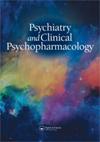多囊卵巢综合征患者配合性改变
IF 0.5
4区 医学
Q4 PHARMACOLOGY & PHARMACY
引用次数: 0
摘要
摘要目的:本研究旨在比较多囊卵巢综合征(PCOS)患者与年龄体质指数匹配的健康对照(HC)的气质和性格特征。我们假设PCOS患者在气质和性格特征方面与hc患者有所不同。材料与方法:50例诊断为多囊卵巢综合征的患者和42例年龄-体重指数匹配的健康对照(HC)纳入研究。用气质性格量表(TCI)和状态-特质焦虑量表(sti -1和sti -2)比较各组气质性格特征和焦虑状况。结果:患者与对照组在合作维度上差异有统计学意义(t =−2.81;p = 0.006)。PCOS组的平均值较低(20.98,2.992)。此外,PCOS组的sti -1和sti -2评分显著高于HC组(分别为;t = 5.70;p < 0.001;t = 2.12;p = 0.037)。多囊卵巢综合征组的合作性和多变量方差分析得分均显著降低。结论:与HC相比,PCOS患者具有较低的合作性等显著差异的性格特征。此外,通过协变分析,我们发现这种不同的性格维度可能是PCOS的一个特征。我们认为我们的结果支持多囊卵巢综合征的精神病学背景。本文章由计算机程序翻译,如有差异,请以英文原文为准。
Altered cooperativeness in patients with polycystic ovary syndrome
ABSTRACT OBJECTIVE: In the present study, we aimed to compare temperament and character traits between patients with polycystic ovary syndrome (PCOS) and age-body mass index-matched healthy controls (HC). We hypothesized that patient with PCOS would differ in terms of temperament and character traits compared with HCs. MATERIAL AND METHODS: Fifty patients who were diagnosed with PCOS and 42 age-body mass index-matched healthy controls (HC) were included in the study. The groups were compared in terms of temperament and character traits and anxiety status with the Temperament and Character Inventory (TCI) and State-Trait Anxiety Inventory (STAI-1 and STAI-2). FINDINGS: There was a statistically significant difference between patient and the control group in terms of cooperativeness dimension (t = −2.81; p = 0.006). It was a lower mean in the PCOS group (20.98 2.992). In addition, scores of STAI-1 and STAI-2 were significantly higher in the PCOS group compared with the HC group (respectively; t = 5.70; p < 0.001; t = 2.12; p = 0.037). The score of cooperativeness and multivariate analysis of variance was found to be significantly lower in the PCOS group. CONCLUSIONS: Patients with PCOS had significant a different character trait such as lower cooperativeness compared with HC. Additionally, we found that this different character dimension would be a trait in PCOS after covariant analysis. We suggest that our result supported the psychiatric background of PCOS.
求助全文
通过发布文献求助,成功后即可免费获取论文全文。
去求助
来源期刊

Psychiatry and Clinical Psychopharmacology
Medicine-Psychiatry and Mental Health
CiteScore
1.00
自引率
14.30%
发文量
0
期刊介绍:
Psychiatry and Clinical Psychopharmacology aims to reach a national and international audience and will accept submissions from authors worldwide. It gives high priority to original studies of interest to clinicians and scientists in applied and basic neurosciences and related disciplines. Psychiatry and Clinical Psychopharmacology publishes high quality research targeted to specialists, residents and scientists in psychiatry, psychology, neurology, pharmacology, molecular biology, genetics, physiology, neurochemistry, and related sciences.
 求助内容:
求助内容: 应助结果提醒方式:
应助结果提醒方式:


